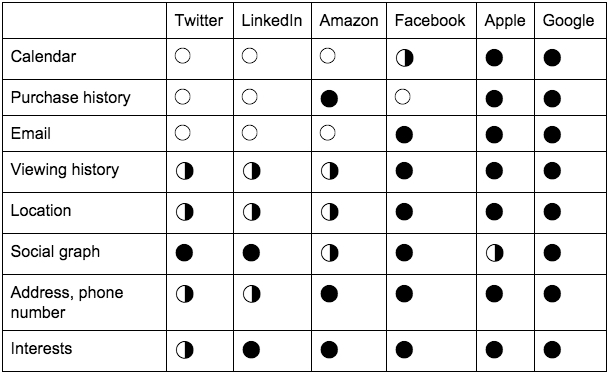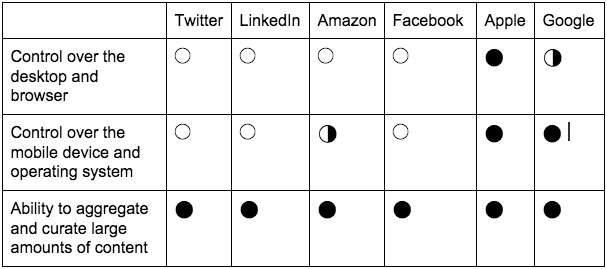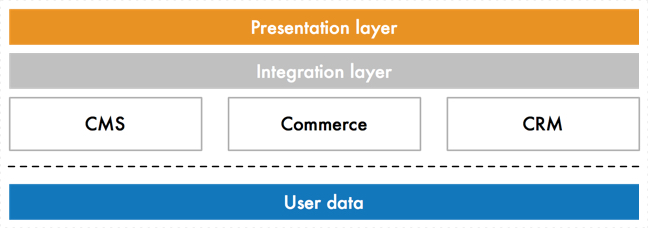Winning back the Open Web
The web was born as an open, decentralized platform allowing different people in the world to access and share information. I got online in the mid-nineties when there were maybe 100,000 websites in the world. Google didn't exist yet and Steve Jobs had not yet returned to Apple. I remember the web as an "Open Web" where no one was really in control and everyone was able to participate in building it. Fast forward twenty years, and the web has taken the world by storm. We now have a hundreds of millions of websites. Look beyond the numbers and we see another shift: the rise of a handful of corporate "Walled Gardens" like Facebook, Google and Apple that are becoming both the entry point and the gatekeepers of the web. Their dominance has given rise to major concerns.
We call them "Walled Gardens" because they control the applications, content and media on their platform. Examples include Facebook or Google, which control what content we get to see; or Apple, which restricts us to running approved applications on iOS. This is in contrast to the Open Web, where users have unrestricted access to applications, content and media.
Facebook is feeling the heat from Google, Google is feeling the heat from Apple but none of these Walled Gardens seem to be feeling the heat from an Open Web that safeguards our privacy and our society's free flow of information.
This blog post is the result of people asking questions and expressing concerns about a few of my last blog posts like the Big Reverse of the Web, the post-browser era of the web is coming and my DrupalCon Los Angeles keynote. Questions like: Are Walled Gardens good or bad? Why are the Walled Gardens winning? And most importantly; how can the Open Web win? In this blog post, I'd like to continue those conversations and touch upon these questions.
Are Walled Gardens good or bad for the web?
What makes this question difficult is that the Walled Gardens don't violate the promise of the web. In fact, we can credit them for amplifying the promise of the web. They have brought hundreds of millions of users online and enabled them to communicate and collaborate much more effectively. Google, Apple, Facebook and Twitter have a powerful democratizing effect by providing a forum for people to share information and collaborate; they have made a big impact on human rights and civil liberties. They should be applauded for that.
At the same time, their dominance is not without concerns. With over 1 billion users each, Google and Facebook are the platforms that the majority of people use to find their news and information. Apple has half a billion active iOS devices and is working hard to launch applications that keep users inside their walled garden. The two major concerns here are (1) control and (2) privacy.
First, there is the concern about control, especially at their scale. These organizations shape the news that most of the world sees. When too few organizations control the media and flow of information, we must be concerned. They are very secretive about their curation algorithms and have been criticized for inappropriate censoring of information.
Second, they record data about our behavior as we use their sites (and the sites their ad platforms serve) inferring information about our habits and personal characteristics, possibly including intimate details that we might prefer not to disclose. Every time Google, Facebook or Apple launch a new product or service, they are able to learn a bit more about everything we do and control a bit more about our life and the information we consume. They know more about us than any other organization in history before, and do not appear to be restricted by data protection laws. They won't stop until they know everything about us. If that makes you feel uncomfortable, it should. I hope that one day, the world will see this for what it is.
While the Walled Gardens have a positive and democratizing impact on the web, who is to say they'll always use our content and data responsibly? I'm sure that to most critical readers of this blog, the Open Web sounds much better. All things being equal, I'd prefer to use alternative technology that gives me precise control over what data is captured and how it is used.
Why are the Walled Gardens winning?
Why then are these Walled Gardens growing so fast? If the Open Web is theoretically better, why isn't it winning? These are important questions about future of the Open Web, open source software, web standards and more. It is important to think about how we got to a point of walled garden dominance, before we can figure out how an open web can win.
The biggest reason the Walled Gardens are winning is because they have a superior user experience, fueled by data and technical capabilities not easily available to their competitors (including the Open Web).
Unlike the Open Web, Walled Gardens collect data from users, often in exchange for free use of a service. For example, having access to our emails or calendars is incredibly important because it's where we plan and manage our lives. Controlling our smartphones (or any other connected devices such as cars or thermostats) provides not only location data, but also a view into our day-to-day lives. Here is a quick analysis of the types of data top walled gardens collect and what they are racing towards:

On top of our personal information, these companies own large data sets ranging from traffic information to stock market information to social network data. They also possess the cloud infrastructure and computing power that enables them to plow through massive amounts of data and bring context to the web. It's not surprising that the combination of content plus data plus computing power enables these companies to build better user experiences. They leverage their data and technology to turn "dumb experiences" into smart experiences. Most users prefer smart contextual experiences because they simplify or automate mundane tasks.

Can the Open Web win?
I still believe in the promise of highly personalized, contextualized information delivered directly to individuals, because people ultimately want better, more convenient experiences. Walled Gardens have a big advantage in delivering such experiences, however I think the Open Web can build similar experiences. For the Open Web to win, we first must build websites and applications that exceed the user experience of Facebook, Apple, Google, etc. Second, we need to take back control of our data.
Take back control over the experience
The obvious way to build contextual experiences is by combining different systems that provide open APIs; e.g. we can integrate Drupal with a proprietary CRM and commerce platform to build smart shopping experiences. This is a positive because organizations can take control over the brand experience, the user experience and the information flow. At the same time users don't have to trust a single organization with all of our data.

To deliver the best user experience, you want "loosely-coupled architectures with a highly integrated user experience". Loosely-coupled architectures so you can build better user experiences by combining your systems of choice (e.g. integrate your favorite CMS with your favorite CRM with your favorite commerce platform). Highly-integrated user experiences so can build seamless experiences, not just for end-users but also for content creators and site builders. Today's Open Web is fragmented. Integrating two platforms often remains difficult and the user experience is "mostly disjointed" instead of "highly integrated". As our respective industries mature, we must focus our attention to integrating the user experience as well as the data that drives that user experience. The following "marketecture" illustrates that shift:

For the time being, we have to integrate with the big Walled Gardens. They need access to great content for their users. In return, they will send users to our sites. Content management platforms like Drupal have a big role to play, by pushing content to these platforms. This strategy may sound counterintuitive to many, since it fuels the growth of Walled Gardens. But we can't afford to ignore ecosystems where the majority of users are spending their time.
Control personal data
At the same time, we have to worry about how to leverage people's data while protecting their privacy. Today, each of these systems or components contain user data. The commerce system might have data about past purchasing behavior, the content management system about who is reading what. Combining all the information we have about a user, across all the different touch-points and siloed data sources will be a big challenge. Organizations typically don't want to share user data with each other, nor do users want their data to be shared without their consent.
The best solution would be to create a "personal information broker" controlled by the user. By moving the data away from the applications to the user, the user can control what application gets access to what data, and how and when their data is shared. Applications have to ask the user permission to access their data, and the user explicitly grants access to none, some or all of the data that is requested. An application only gets access to the data that we want to share. Permissions only need to be granted once but can be revoked or set to expire automatically. The application can also ask for additional permissions at any time; each time the person is asked first, and has the ability to opt out. When users can manage their own data and the relationships they have with different applications, and by extension with the applications' organizations, they take control over their own privacy. The government has a big role to play here; privacy law could help accelerate the adoption of "personal information brokers".


Conclusion
People don't seem so concerned about their data being hosted with these Walled Gardens since they've willingly given it to date. For the time being, "free" and "convenient" will be hard to beat. However, my prediction is that these data privacy issues are going to come to a head in the next five to ten years, and lack of transparency will become unacceptable to people. The Open Web should focus on offering user experiences that exceed those provided by Walled Gardens, while giving users more control over their user data and privacy. When the Open Web wins through improved transparency, the closed platforms follow suit, at which point they'll no longer be closed platforms. The best case scenario is that we have it all: a better data-driven web experience that exists in service to people, not in the shadows.
— Dries Buytaert
Dries Buytaert is an Open Source advocate and technology executive. More than 10,000 people are subscribed to his blog. Sign up to have new posts emailed to you or subscribe using RSS. Write to Dries Buytaert at dries@buytaert.net.